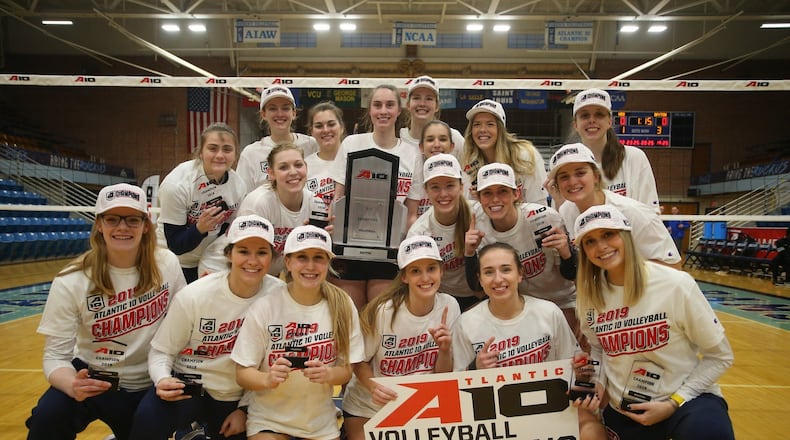Commissioner Bernadette McGlade provided an update Monday on a conference call with reporters. It was clear from the conversation it’s too early to provide anything more than speculation about the various sports, including volleyball, field hockey, men’s and women’s soccer and cross country.
“From a contingency standpoint, we feel like we need to keep everything on the table for discussion,” McGlade said.
Among the ideas being discussed are:
1. A reduction in the conference schedule: Volleyball teams, for example, play 14 A-10 matches. Last year, the Dayton Flyers opened A-10 play on Sept. 27.
If teams played fewer than 14 matches, it would have to be a number, McGlade said, “”that would still maintain the integrity of a conference regular-season schedule in preparation for a championship.”
2. Eliminating the conference tournaments: The A-10 hosts championships in volleyball, men's and women's soccer and field hockey in the fall, and the winner of those tournaments earns a automatic NCAA tournament bid.
“If the NCAA championships are in fact intact,” McGlade said, “we could name our regular-season champion the (automatic qualifier) and essentially not have an A-10 championship. That’s one of our least preferable options.”
» SCHEDULE NEWS: UD to play two SEC teams
At the very least, McGlade would hope to have four teams qualify for those championships instead of eight.
“We’re calling it a Final Four A-10 championship,” McGlade said, “where we take the top four teams and have an A-10 championship with what essentially would be semifinals and finals, so that we can still keep the student-athlete experience intact.”
3. Moving the fall season: If campuses don't reopen in time and the A-10 loses the fall season, it will consider moving those sports to the winter or spring. That could bring up some financial problems, McGlade said, and issues with the availability of fields and weight rooms.
“Is it even feasible to have the fall sports compete in a spring season?” McGlade said, “And is it feasible to do it simultaneously with all those other events in spring sports that would be going on too. There’s a lot of moving parts to that decision.”
4. Reducing travel: Every program in the A-10 has to travel by air often during the season. The conference blueprint spreads from Rhode Island and Massachusetts south to Davidson in North Carolina and as far west as Saint Louis. The conference is considering a 25-percent reduction in travel for the fall sports teams, giving them each of a more regional schedule.
» FOOTBALL: Saints see UD’s Trautman as dominant player
“We’ve also kept on the drawing board the potential of doing some regional competitions if we needed to with neighboring Division I conferences,” McGlade said, “so that we could actually fill out schedules, if we had the opportunities to in fact play and compete in a fall schedule. If minimizing air flights and long-distance travel is is going to be a factor in the safety and well being and even the anxiety level of student-athletes and coaches and support staff, I think that’s going to be something that all of us are going to be very mindful of in decisions that we make not for the immediate future but probably for a little bit longer.”
All those ideas depend on the student-athletes getting to campus and getting time to train before beginning to compete. McGlade knows A-10 athletes have been training independently at home in various situations.
“Some student-athletes are probably training at a very high level,” she said. “Other student-athletes may not have the wherewithal to be keeping in what we would call playing shape. Student athletes are going to have to not only return to campus but have the adequate time to be able to re-acclimate to normalcy and re-acclimate to rigorous training and to be prepared for competitive schedule.”
About the Author

